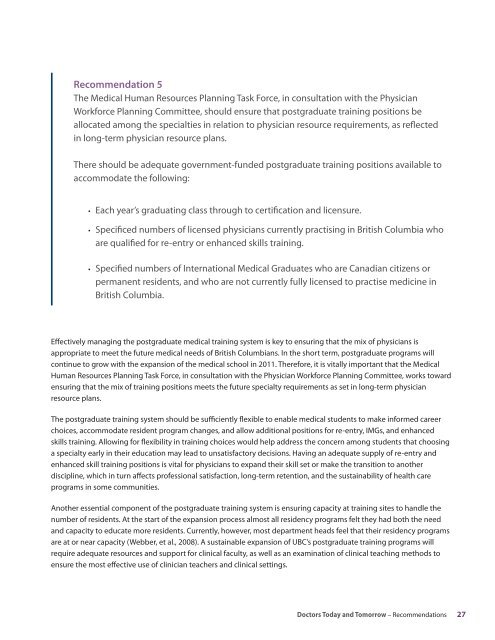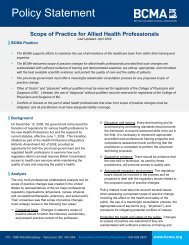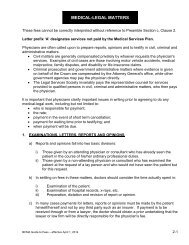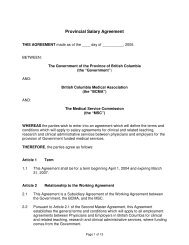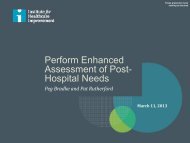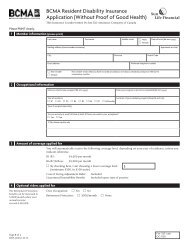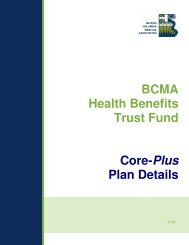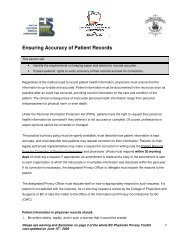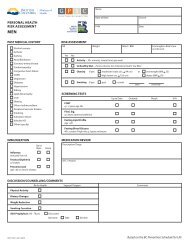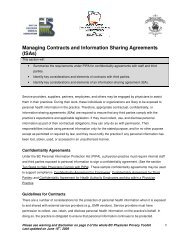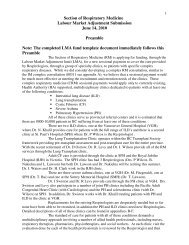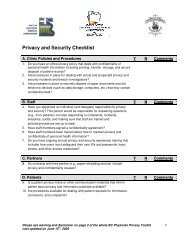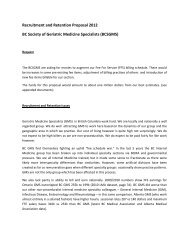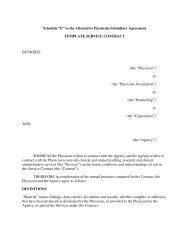Doctors Today and Tomorrow - British Columbia Medical Association
Doctors Today and Tomorrow - British Columbia Medical Association
Doctors Today and Tomorrow - British Columbia Medical Association
Create successful ePaper yourself
Turn your PDF publications into a flip-book with our unique Google optimized e-Paper software.
Recommendation 5<br />
The <strong>Medical</strong> Human Resources Planning Task Force, in consultation with the Physician<br />
Workforce Planning Committee, should ensure that postgraduate training positions be<br />
allocated among the specialties in relation to physician resource requirements, as reflected<br />
in long-term physician resource plans.<br />
There should be adequate government-funded postgraduate training positions available to<br />
accommodate the following:<br />
• Each year’s graduating class through to certification <strong>and</strong> licensure.<br />
• Specificed numbers of licensed physicians currently practising in <strong>British</strong> <strong>Columbia</strong> who<br />
are qualified for re-entry or enhanced skills training.<br />
• Specified numbers of International <strong>Medical</strong> Graduates who are Canadian citizens or<br />
permanent residents, <strong>and</strong> who are not currently fully licensed to practise medicine in<br />
<strong>British</strong> <strong>Columbia</strong>.<br />
Effectively managing the postgraduate medical training system is key to ensuring that the mix of physicians is<br />
appropriate to meet the future medical needs of <strong>British</strong> <strong>Columbia</strong>ns. In the short term, postgraduate programs will<br />
continue to grow with the expansion of the medical school in 2011. Therefore, it is vitally important that the <strong>Medical</strong><br />
Human Resources Planning Task Force, in consultation with the Physician Workforce Planning Committee, works toward<br />
ensuring that the mix of training positions meets the future specialty requirements as set in long-term physician<br />
resource plans.<br />
The postgraduate training system should be sufficiently flexible to enable medical students to make informed career<br />
choices, accommodate resident program changes, <strong>and</strong> allow additional positions for re-entry, IMGs, <strong>and</strong> enhanced<br />
skills training. Allowing for flexibility in training choices would help address the concern among students that choosing<br />
a specialty early in their education may lead to unsatisfactory decisions. Having an adequate supply of re-entry <strong>and</strong><br />
enhanced skill training positions is vital for physicians to exp<strong>and</strong> their skill set or make the transition to another<br />
discipline, which in turn affects professional satisfaction, long-term retention, <strong>and</strong> the sustainability of health care<br />
programs in some communities.<br />
Another essential component of the postgraduate training system is ensuring capacity at training sites to h<strong>and</strong>le the<br />
number of residents. At the start of the expansion process almost all residency programs felt they had both the need<br />
<strong>and</strong> capacity to educate more residents. Currently, however, most department heads feel that their residency programs<br />
are at or near capacity (Webber, et al., 2008). A sustainable expansion of UBC’s postgraduate training programs will<br />
require adequate resources <strong>and</strong> support for clinical faculty, as well as an examination of clinical teaching methods to<br />
ensure the most effective use of clinician teachers <strong>and</strong> clinical settings.<br />
<strong>Doctors</strong> <strong>Today</strong> <strong>and</strong> <strong>Tomorrow</strong> – Recommendations 27


